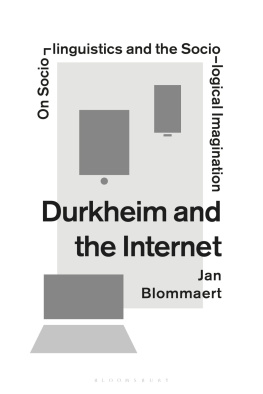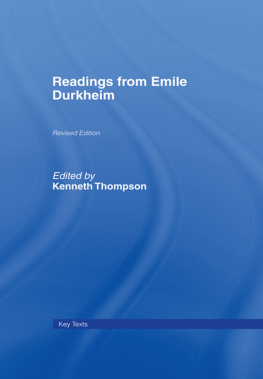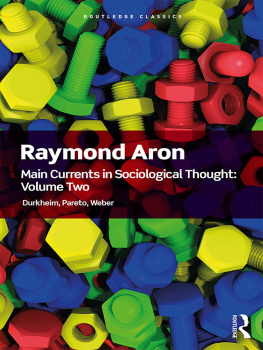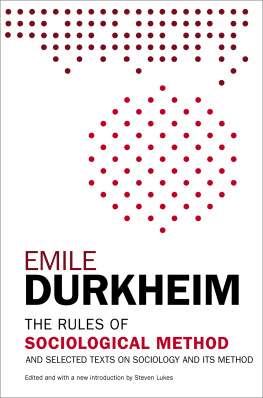Blommaert Jan - Durkheim and the Internet: sociolinguistics and the sociological imagination
Here you can read online Blommaert Jan - Durkheim and the Internet: sociolinguistics and the sociological imagination full text of the book (entire story) in english for free. Download pdf and epub, get meaning, cover and reviews about this ebook. City: London, year: 2018, publisher: Bloomsbury UK, genre: Politics. Description of the work, (preface) as well as reviews are available. Best literature library LitArk.com created for fans of good reading and offers a wide selection of genres:
Romance novel
Science fiction
Adventure
Detective
Science
History
Home and family
Prose
Art
Politics
Computer
Non-fiction
Religion
Business
Children
Humor
Choose a favorite category and find really read worthwhile books. Enjoy immersion in the world of imagination, feel the emotions of the characters or learn something new for yourself, make an fascinating discovery.
- Book:Durkheim and the Internet: sociolinguistics and the sociological imagination
- Author:
- Publisher:Bloomsbury UK
- Genre:
- Year:2018
- City:London
- Rating:3 / 5
- Favourites:Add to favourites
- Your mark:
- 60
- 1
- 2
- 3
- 4
- 5
Durkheim and the Internet: sociolinguistics and the sociological imagination: summary, description and annotation
We offer to read an annotation, description, summary or preface (depends on what the author of the book "Durkheim and the Internet: sociolinguistics and the sociological imagination" wrote himself). If you haven't found the necessary information about the book — write in the comments, we will try to find it.
Blommaert Jan: author's other books
Who wrote Durkheim and the Internet: sociolinguistics and the sociological imagination? Find out the surname, the name of the author of the book and a list of all author's works by series.
Durkheim and the Internet: sociolinguistics and the sociological imagination — read online for free the complete book (whole text) full work
Below is the text of the book, divided by pages. System saving the place of the last page read, allows you to conveniently read the book "Durkheim and the Internet: sociolinguistics and the sociological imagination" online for free, without having to search again every time where you left off. Put a bookmark, and you can go to the page where you finished reading at any time.
Font size:
Interval:
Bookmark:

Durkheim and the Internet
Also available from Bloomsbury
Technolingualism: The Mind and the Machine
by James Pfrehm
Linguanomics: What is the Market Potential of Multilingualism?
by Gabrielle Hogan-Brun
Wordcrime: Solving Crime Through Forensic Linguistics
by John Olsson
A man with one theory is lost
(Bertolt Brecht)
For Ben Rampton and Rob Moore
Durkheim and the Internet
Sociolinguistics and the Sociological Imagination
JAN BLOMMAERT

Contents
Whenever we do research, we carry along large sets of assumptions, often tacitly and often without much critical reflection. These assumptions are a form of imagination, and they consist of images of social actions and the contexts in which they are situated, all of which we presume to be adequately represented and enacted in the empirical data we examine and, by implication, validating the actual ways we examine such data. Since these sets of assumptions are often shared by large bodies of researchers, they also identify and define disciplines, schools and trends of scholarship again often tacitly and without being made too often into objects of inquiry in their own right.
In this book, I shall engage with such deeply rooted, widespread and defining assumptions in a very broad field of studies of language-in-society, for which I propose to use the label of sociolinguistics as an ad hoc shorthand, mainly for reasons of editorial parsimony but also for more substantial reasons. My own work over three decades has been performed under a variety of labels, from pragmatics and discourse analysis, via literacy studies, narrative studies, linguistic landscape studies, social media studies, educational linguistics and linguistic ethnography, to sociolinguistics and linguistic anthropology (with an occasional foray into linguistics and literary studies). It was held together, in spite of its diversity, by a central concern about the complex place of language in society, the dialectics that tied language and society together, and the difficulties of decoding, understanding and explaining such ties a central concern which is fundamentally sociolinguistic, if you wish. My choice of sociolinguistic as the ad hoc label here, therefore, points to the fact that I wish to address assumptions that direct and guide work addressing, in a wide variety of ways, the ties between language and society. And this, of course, makes this a work of theory. But two qualifications are in order.
First qualification: theory, in my view, is in no sense definitive; it is merely an intermediary stage in a longitudinal process of knowledge development. It is a stage where the concepts, postulates and premises [are being] straightened out, after which, to quote Gregory Batesons fine lines,
analysts will be able to embark on a new and still more fruitful orgy of loose thinking, until they reach a stage at which again the results of their thinking must be strictly conceptualized. (Bateson 1972: 87)
Bateson put a premium on this combination of loose and strict thinking which he saw as the most precious tool of science (1972: 75). Scientists need the messiness and chaos of actual confrontations with empirical cases and data in order to arrive at systematic theories, which then must again be used in loose practices of scientific problem-solving. As for the latter, their very looseness allows us to discover phenomena whose existence we were unaware of at the beginning of the research (Becker et al. 1961: 18). The looseness, thus, enables the critical fact-checking of theories. The theories I shall present here will be most useful if they are used in that sense: as moments of strict thinking in between moments of actual problem-solving which can confirm, defy or amend them. They were not written for eternity.
For this is the second qualification: theory is a tool from and for research. This may sound self-explanatory, but it is not: there is a terrific amount of theory available that is presented as a self-contained intellectual product, to be solely addressed as theory . Not here. Whatever theory I have to offer has its feet firmly in very large amounts of empirical research; it represents a moment of strict thinking in an ongoing research process, and it must be fed back to it. Why do we need it then? To quote Anselm Strauss, we need theory to stimulate your imagination as well as suggest research directions to you (Strauss 1993: 50). The imaginative dimension of theory, Strauss argued, can help us
by enhancing sensitivities to what otherwise might be overlooked; it raises astute questions that might not be raised; and it can minimize becoming captive to overly simple explanatory models, or doctrines, that are claimed as interpreting or explaining human life and behavior. (1993: 49)
Rather than constraining thought, I see theory (as understood here) as liberating, as a tool that enables us to explore further and think what has not been thought before. The theories that enable such liberating creativity must naturally be its first victims. But as I said, they were not written for eternity.
The kinds of research on which my theoretical statements are based are sociolinguistic in the sense specified above; the research directions they might suggest, however, are not confined to sociolinguistics but should be influenced by it. In this book, I look at society through the lens of language and interaction; the things we, as sociolinguists, have come to know about how humans interact by means of continuously expanding and changing language-communicative resources, can serve as a take-off point for looking at how society-at-large moves, changes, develops. This is the core assumption in this book: that sociolinguistic insights have far wider relevance, that they constitute a tremendous asset for innovative social thought, and are ready to be deployed in a very wide range of research efforts in social sciences and humanities.
While I have written this book in the strictest solitude and as a process of reflexive critique, it is and remains, of course, the fruit of dialogue an intense collaborative dialogue I have maintained with a large community of colleagues, research partners and friends. Much of what it contains was raised as a topic of discussion with consecutive generations of PhD researchers as informal seminars or as direct targeted dialogue on specific analytical issues and with close colleagues in my own institution, the InCoLaS consortium, and further afield. I avoid listing names here, for the list would be extraordinarily long (and still necessarily incomplete). Many friends, colleagues, partners and students will know that they are included in these opaque lines, and to many others I should say: when in doubt, consider yourself addressed and gratefully acknowledged for the inspiration I received from you.
In a more practical way, this book owes its smooth and painless birth due to Gurdeep Mattu of Bloomsbury, who discovered the draft version and offered me the excellent publishing support of his team, and to my executive editor Karin Berkhout, who, as so often, made sure that a pile of paper turned into a book manuscript. I thank both for their contributions to this project.
Antwerp, June 2017
Over two decades ago, the Welsh sociologist Glyn Williams (1992) wrote a devastating review of the sociological underpinnings of the sociolinguistics of his day. His findings were (not to put too fine a point on it) that sociolinguistics was often a combination of very good and even avant-garde linguistics with conventional sociology. So, while sociolinguists appeared as leaders and innovators in the field of advanced linguistic analysis, they would be mere followers in the field of sociological reflection, happy to adopt, often implicitly and without much questioning or motivation, mainstream forms of sociological imagination (cf. Mills 1959). This led to images of society characterized by social integration, social consensus and cooperation, the relative stability of social relations and identities, and clearly delineated national units and group identities as circumscriptions for analysis recipes from the kitchen of Talcott Parsons, according to Glyn Williams.
Font size:
Interval:
Bookmark:
Similar books «Durkheim and the Internet: sociolinguistics and the sociological imagination»
Look at similar books to Durkheim and the Internet: sociolinguistics and the sociological imagination. We have selected literature similar in name and meaning in the hope of providing readers with more options to find new, interesting, not yet read works.
Discussion, reviews of the book Durkheim and the Internet: sociolinguistics and the sociological imagination and just readers' own opinions. Leave your comments, write what you think about the work, its meaning or the main characters. Specify what exactly you liked and what you didn't like, and why you think so.





